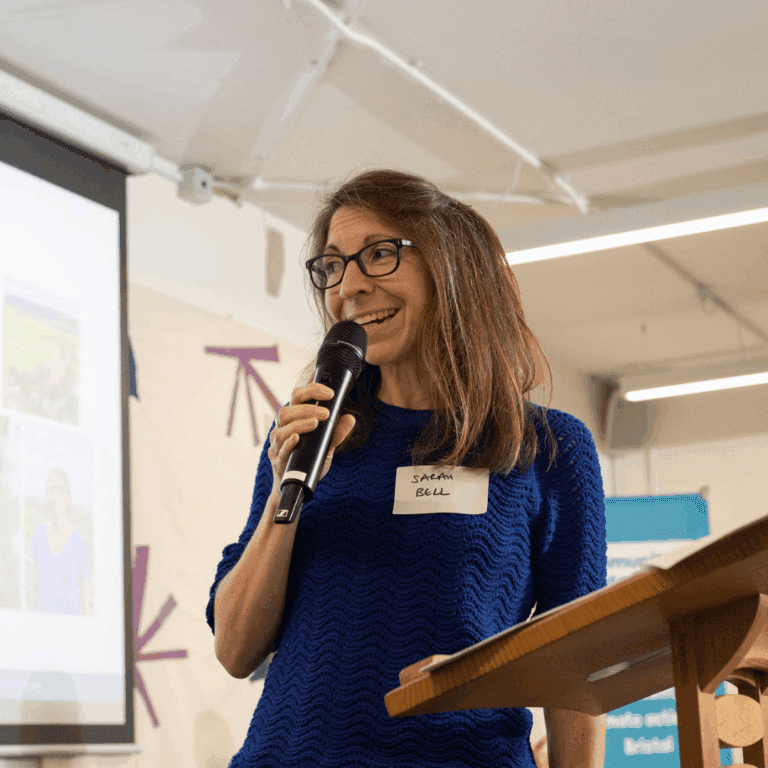Crip Up Climate Conversations
Over the last couple of years, Sarah Bell from Sensing Climate and Emma Geen, our Climate & Disability Associate, have been developing the ‘Crip Up Climate Conversations’ guidance series. In this blog, Sarah outlines how this guidance can support respectful conversations about disability and the climate crisis, informing collective climate action that leaves no one behind.
The idea for the Crip Up Climate Conversations guidance came from early discussions between Emma and I in 2021, when very little was being done around disability and climate change.
When not framed out of discussions about climate change, Disabled people were often framed simply as one of several ‘climate vulnerable’ groups, with little reflection on the social, political and economic systems that create vulnerability.
This is not to say that vulnerability doesn’t exist. It does. But vulnerability is created by our society not by our bodies, and it doesn’t have to be that way.
The single story of vulnerability also overlooks the rich knowledge and skills of Disabled people within climate action. Climate change is disabling; it is making our world more uncertain, more unpredictable, more harmful. Yet the people who know what it means to navigate a disabling world – Disabled people – are so often left out of this work.
Stories have powerful effects on how we understand the world. They may echo existing stereotypes and expectations of how people live – or ‘should’ live – in the world. Or, they can be used to resist these; and to widen out whose lives, and ways of living, are valued and respected.
In the ‘Crip Up Climate Conversations’ guidance, we share new stories that value the knowledge of Disabled people about living within limits, problem solving and creating communities of care. These stories recognise how climate action – if designed and implemented properly – may be our best opportunity to make our everyday environments more accessible in our lifetimes.
Why do we need new stories?
“I know how easy it is for… campaigns to turn disabled folks into shake-your-head statistics, how easy it is to write us off as the ruined ones… I have a fierce love for disabled folks, a love that insists we matter as we are… We are all more than the worst that has been done to us.”
Professor Julia Watts-Belser, Author of Loving Our Own Bones
We can look beyond statistics and stereotypes, beyond single stories. We can make space to really listen to each other, to hear and understand what each of our lives actually look and feel like and why. The Crip Up Climate Conversations guidance aims to support people in creating those spaces to share and to listen to each other.
As one of our Sensing Climate research participants expressed so clearly, when you are or become disabled, you get thrown into the ‘education business’. You have to constantly educate others about what it takes to have your needs met – and this asks a lot of people who are already navigating the load of an inaccessible world.
So, we have created these resources to help people develop a baseline understanding of what people might need, to give an idea of what to include in any funding bids that people might be writing to support accessible and inclusive approaches to engagement and co-production, and to suggest why and how some environmental messages might be more alienating than others.
But this guidance is just the starting point – it is essential to take the time to listen to individual priorities and needs as we’re all different! If you make a mistake – we all do, we’re human – learn from it, find a way to make amends, and do something differently the next time. We’re all finding our way and learning. The more we can do that together, the better.
The focus of the guidance
There are four guidance notes, for people who would like to initiate conversations around climate action and disability with:
- Disabled people and Disabled People’s Organisations (DPOs);
- People involved in the climate and environmental movement who might not understand disability or the knowledge that it brings;
- Policy and decision-makers;
- People who would like to co-produce a community climate action plan with Disabled people. This fourth guidance note was created in collaboration with the Community Climate Action Project coordinated by Bristol Climate & Nature Partnership, and funded by the National Lottery.
Each guidance document includes tips and advice, examples, and more information on our approach, which emphasises continuous learning, building relationships, drawing on a range of tactics, engaging in care to reduce the risk of burnout, recognising diversity amongst the disabled community, and sharing the load – one person cannot do everything.
Reclaiming language
The guidance series is called ‘Crip Up Climate Conversations’. The term ‘crip’ has been reclaimed within disability activist communities in recent years to signal political resistance and community affiliation. It is used to affirm disability as a desirable part of the world and to recognise that more inclusive, accessible worlds are possible.
However, we recognise that its use is not universal and that not all Disabled people will be comfortable with its origins. By ‘Crip Up’ we are talking about the disabled community reclaiming space within climate conversations, amplifying and having disabled leadership taken seriously.
We encourage people to adapt this guidance to other contexts. If you would like to find out more or chat about the guides, please contact Sarah on Sarah.Bell@exeter.ac.uk or Emma on climatedisability@bristolclimatenature.org
Share to
